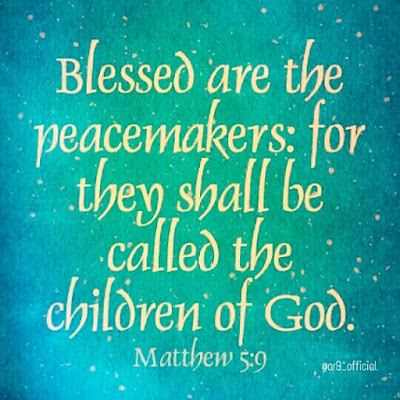THE SERMON ON THE MOUNT
(A Mountain Plateau not far from Capernaum)
Subdivision B.
BEATITUDES: PROMISES TO MESSIAH'S SUBJECTS
MATT 5:3-12
LUKE 6:20-26
Mat 5:9 “Blessed are the peacemakers, for they shall be called sons of God."
Strong's Hebrew & Greek Dictionary translates the word peacemakers as "peaceable." Tyndale reckons it "the maintainers of peace. " The Pulpit Commentary takes pains to clarify that it means "...more than "peaceable." This is the peaceable character consciously exerted outside itself." -Pulpit Commentary
After studying several commentaries on this verse, my greatest takeaways are
1. This is an active peacemaking--not passivity or absence of conflict by default.
2. All peace originates from our reconciliation with God, both in our ability to be peacemakers and in our mission to promote peace. As Christians, our first responsibility must be to point others to Jesus as the source of all peace.
"For he is our peace, who hath made both one, and hath broken down the middle wall of partition between us." -Ephesians 2:14
"This is not how they become sons of God—that can only happen by receiving Jesus Christ as Savior (Joh_1:12). By making peace, believers manifest themselves as sons of God, and God will one day acknowledge them as people who bear the family likeness." Believer's Bible
3. The activity of peacemaking is not rosy and conflict free; it involves stepping into difficult situations in ways that may compromise our comfort. Note: comfort is not synonymous with peace.
"It is hard enough to keep the peace. It is still more difficult to bring peace where it is not. “The perfect peacemaker is the Son of God." -McNeile
"Notice that the Lord is not speaking about people with a peaceful disposition or those who love peace. He is referring to those who actively intervene to make peace. The natural approach is to watch strife from the sidelines. The divine approach is to take positive action toward creating peace, even if it means taking abuse and invective." -Believer's Bible
Regarding wisdom and peace:
Here again is the notion of "purity" (the prior Beatitude) but specified as the principal quality of "wisdom from above." Peaceable is the second quality. A typical working definition of wisdom could originate from many points, but "pure" and "peaceable" are surprising and definitely in contrast with the world's perception of wisdom which might begin with knowledge or experience.
Our pastor is doing a series on the hard sayings of Jesus and spoke this morning about this passage from Luke:
| from the website Atheist Republic |
“I came to cast fire on the earth, and would that it were already kindled! I have a baptism to be baptized with, and how great is my distress until it is accomplished! Do you think that I have come to give peace on earth? No, I tell you, but rather division. For from now on in one house there will be five divided, three against two and two against three. They will be divided, father against son and son against father, mother against daughter and daughter against mother, mother-in-law against her daughter-in-law and daughter-in-law against mother-in-law.” Luke 12:49-53
Of course I sat there wondering how to reconcile the two passages. As Christians, I think we are called to address seemingly conflicting passages with humility and careful study; otherwise the atheist cynics seemingly win.
How can a peacemaker be blessed and Jesus be our peace, yet he states he has come to bring division? The division our pastor spoke of was the future judgement of the saved and damned. I'm struck by how offensive it sounds to write those words out, but the unavoidable tenant of Christianity is that there is Hell and Heaven, that there will be a division, as horrible as that sounds. This is why Christians go about bothering to share their faith--not because it will save them, but because, if you truly believe there is a coming division and you love people, you wish the best for them.
The juxtaposition of the two statements forces me back to the biblical notion that peace---any kind of authentic peace--originates with the reconciliation between God and man. If there is no reconciliation there, then any type of peace we attempt to muster by ourselves, in the end, be artificial and ineffectual. We may avoid a conflict. We may tolerate injustice. But authentic peace must begin with our relationship with God and then extends to others. If we don't put our own oxygen mask on first, we are unable to help. Man-crafted peace is a veneer at best.


No comments:
Post a Comment